After I watched Smoke Signals for the first time, I sat in the dark and thought about Thomas Builds-the-Fire’s breakfast story:
Hey Victor! I remember the time your father took me to Denny’s, and I had the Grand Slam Breakfast. Two eggs, two pancakes, a glass of milk, and of course my favorite, the bacon. Some days, it’s a good day to die. And some days, it’s a good day to have breakfast.
At the time (spring semester, sophomore year), I extracted a facile reading: “Well, the entire movie centers around Victor’s dysfunctional relationship with his father, Arnold. Thomas Builds-the-Fire, the movie’s de fact0 narrator and resident storyteller, conjures this beautiful breakfast as a representation of Arnold’s soul: fullness (of life, spirit) consigned to mere memory”; a more facile reading: “Arnold lived when he was meant to live and died when he was meant to die”; an ironic and even more facile reading: “We think Arnold lived when he was meant to live and died when he was meant to die and that there is some Providential justice operating within the narrative. In actuality, these codes of helplessness tether the Indian to the reservation”; and an extrapolated reading: “Life’s joyful moments inhabit a space of constant telling, retelling, and storytelling.” All of these silly readings were wrong. They all attempt to extract meaning from an intentionally vacuous saying. “Some days, it’s a good day to die. And some days, it’s a good day to have breakfast” = “Life happens. Eat breakfast. Death happens. Then you don’t eat breakfast anymore.” It is a prosaic understanding of the scene, a glossing that announces, “I give up”— and it is a disconcertingly satisfying interpretation. How can it be that the aphorism, which gestures at a plenitude of meaning, an unfathomable variety of “Indian” wisdom, actually means exactly what it says?
[Before I launch into what is essentially an extended notation of the breakfast aphorism in the English language, I’ll press the pause button. You might have reached this page looking for a lamb hash recipe. In that case—and if you have no interest in the breakfast aphorism in the English language—please scroll to the bottom of the page. There, you will find the requisite lamb hash recipe and a plethora of foodie porn pictures.]
My revised reading takes into account an important and easily missed paradox. The scene assumes a narrative linearity—first you eat breakfast, then there’s the day, the night, and you die. Such a formal, geometric conception of time contradicts the film’s actual narrative, which moves in a fractured, wandering path between a reality of events and the unreality of remembrance. In effect, the narrative destabilizes the logic of story and plot—Thomas Builds-the-Fire’s storytelling disrupts the connection between story (the chronological sequence of events) and plot (the re-ordered presentation of events). Smoke Signals is asynchronous. The film celebrates a non-geometric (or dare I say non-Euclidean) storytelling. Although the narrative operates according to a system of rules—an assumption that information is both plausible and regular—the film continuously questions its own semantics. Why are we, or Victor, to believe Thomas Builds-the-Fire’s story—its content, its narrative context, or its synchronicity?
In fact, we are asked to believe Thomas Builds-the-Fire’s story because he is shamanic, tribal, original, and the film validates the virtue of traditional Indian-ism in opposition to reservation Indian-ism or white-constructed-Indian-ism. But if we trust Thomas Builds-the-Fire as the film’s storyteller, we must simultaneously mistrust his aphorism. Return to the story itself:
Hey Victor! I remember the time your father took me to Denny’s, and I had the Grand Slam Breakfast. Two eggs, two pancakes, a glass of milk, and of course my favorite, the bacon. Some days, it’s a good day to die. And some days, it’s a good day to have breakfast.
Let’s break it down into Barthes’ codes (see S/Z).
Hey Victor! I remember the time your father took me to Denny’s [semic—Denny’s is a fast casual restaurant associated with wealth and whiteness, the non-reservation], and I had the Grand Slam Breakfast [semic—baseball, the specific context of Denny’s, wealth, excess of food]. Two eggs, two pancakes, a glass of milk, and of course my favorite, the bacon. [This is primarily proairetic. The text enunciates discrete events that formulate a coherent narrative.] Some days, it’s a good day to die. And some days, it’s a good day to have breakfast.
<—There. Did you see that?
The film shifts to the cultural code, specifically the gnomic code, a structuring of sayings, aphorisms, epigrams, and proverbs into a narrative element. Here, Thomas Builds-the-Fire attempts to apply Indian (or perhaps reservation) wisdom to an extra-Indian and extra-reservation space. The Grand Slam Breakfast contrasts with fry bread, the reservation’s staple food. Thomas Builds-the-Fire’s grandmother once magically made enough fry bread to feed an impossibly hungry crowd of Indians. In Smoke Signals, fry bread comes to mean reservation-ness, Indian-ness, anti-whiteness, and a kind of ascetic plenty. At the Denny’s, Thomas Builds-the-Fire and Arnold encounter an anti-Indian, white cornucopia. The white viewer expects Thomas Builds-the-Fire’s “Indian” wisdom; his engagement with the cultural code conforms to the “medicine man” stereotype. There is a falseness to his wisdom though. Just as white characters off the reservation caricature as Victor “chief” or “cigar store Indian,” Thomas Builds-the-Fire emblematizes the medicine man. The “medicine man” cannot be exported from the reservation into the Denny’s and deliver sage truth; the Grand Slam Breakfast cannot support the weight of Thomas Builds-the-Fire’s profundity. Instead, the aphorism plummets through egg and bacon into hollowness. Beyond the reservation, it may be true that “some days you eat breakfast, some days you die.” But Thomas Builds-the-Fire’s world, it’s possible to eat breakfast and die everyday, over and over again until the wellspring of stories runs dry. And for Thomas, who repeats the same stories with obstinate fury, every day is an occasion for pancakes in the morning and death in the afternoon.
While Thomas Builds-the-Fire’s aphorism suggests excessive meaning—too many readings to count—the words themselves articulate the terminal meaning. The wisdom of the aphorism lies in its literalness. Unlike the maskings and irregular geometries of the reservation narrative, Thomas Builds-the-Fire’s stories cut to a universalizing truth. Where such a truth emerges from the film, words glisten like a peach pit plucked from free-stone flesh. The kernel of meaning constitutes the words themselves. I learned a lesson from thinking about Smoke Signals: do not overread. I learned a lesson from Thomas Builds-the-Fire: eat breakfast when you should eat breakfast, die when you should die.
With leftover meat from my smoked lamb leg, I made hash for dinner. Some days, it’s a good day to die. And some days, it’s a good day to have breakfast for dinner.
Lamb Hash
4 Yukon Gold potatoes, grated (squeeze the moisture from the potatoes for crispier hash)
3/4 lb. smoked lamb leg, minced and room temperature
4 tbsp butter
salt and pepper, to taste
2 eggs
mixed greens, enough to cover 2 plates
Heat 2 tbsp butter in a giant cast iron pan. Spread the potatoes in a thin layer. Cook over high heat until crispy and browned on one side. Add the lamb, salt, and pepper. Flip all the ingredients, vigorously mix in the pan using a spatula, and then cook until the lamb is warmed through. Cover two plates with the mixed greens. Divide the hash between the two plates, gently positioning it atop the lettuces and herbs. Heat another 2 tbsp butter in the pan. Fry two eggs. Carefully place one egg on top of each plate before serving.

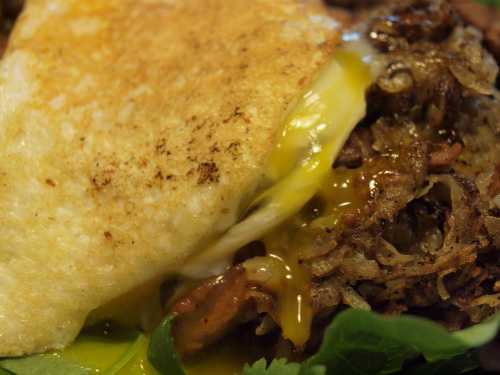
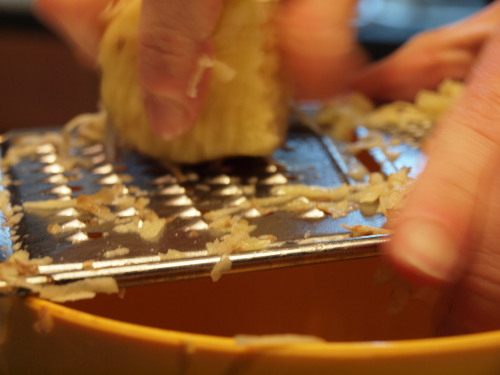
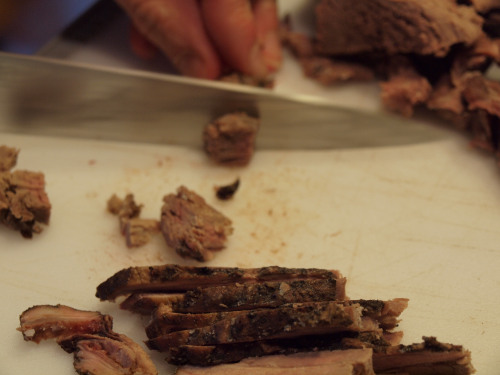
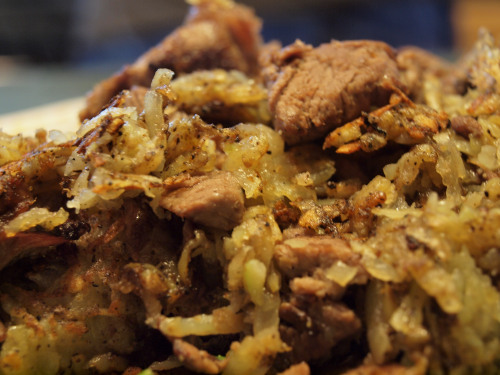
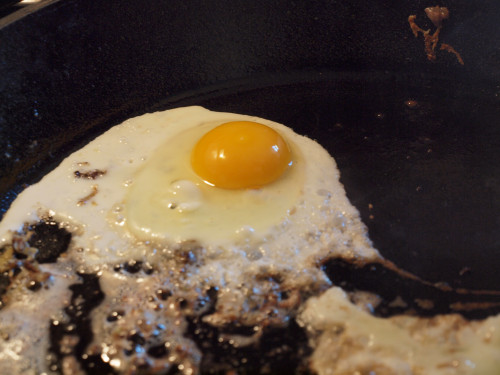

I’m drooling already! I love lamb…and I love hash!